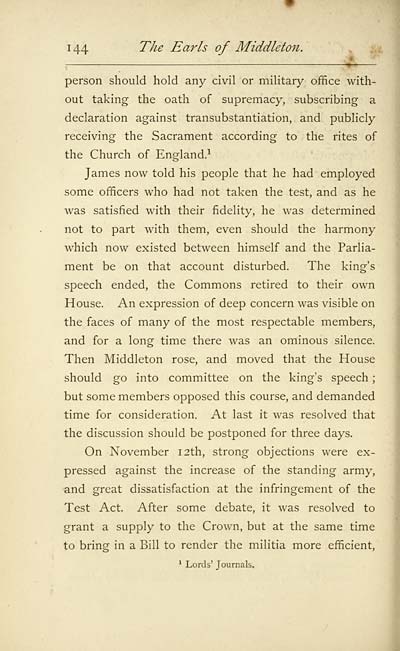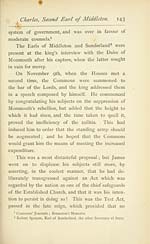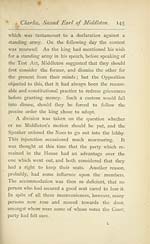Download files
Complete book:
Individual page:
Thumbnail gallery: Grid view | List view

144 The Earls of Middleton.
person should hold any civil or military office with-
out taking the oath of supremacy, subscribing a
declaration against transubstantiation, and publicly
receiving the Sacrament according to the rites of
the Church of England. 1
James now told his people that he had employed
some officers who had not taken the test, and as he
was satisfied with their fidelity, he was determined
not to part with them, even should the harmony
which now existed between himself and the Parlia-
ment be on that account disturbed. The king's
speech ended, the Commons retired to their own
House. An expression of deep concern was visible on
the faces of many of the most respectable members,
and for a long time there was an ominous silence.
Then Middleton rose, and moved that the House
should go into committee on the king's speech ;
but some members opposed this course, and demanded
time for consideration. At last it was resolved that
the discussion should be postponed for three days.
On November 12th, strong objections were ex-
pressed against the increase of the standing army,
and great dissatisfaction at the infringement of the
Test Act. After some debate, it was resolved to
grant a supply to the Crown, but at the same time
to bring in a Bill to render the militia more efficient,
1 Lords' Journals.
person should hold any civil or military office with-
out taking the oath of supremacy, subscribing a
declaration against transubstantiation, and publicly
receiving the Sacrament according to the rites of
the Church of England. 1
James now told his people that he had employed
some officers who had not taken the test, and as he
was satisfied with their fidelity, he was determined
not to part with them, even should the harmony
which now existed between himself and the Parlia-
ment be on that account disturbed. The king's
speech ended, the Commons retired to their own
House. An expression of deep concern was visible on
the faces of many of the most respectable members,
and for a long time there was an ominous silence.
Then Middleton rose, and moved that the House
should go into committee on the king's speech ;
but some members opposed this course, and demanded
time for consideration. At last it was resolved that
the discussion should be postponed for three days.
On November 12th, strong objections were ex-
pressed against the increase of the standing army,
and great dissatisfaction at the infringement of the
Test Act. After some debate, it was resolved to
grant a supply to the Crown, but at the same time
to bring in a Bill to render the militia more efficient,
1 Lords' Journals.
Set display mode to:
![]() Universal Viewer |
Universal Viewer | ![]() Mirador |
Large image | Transcription
Mirador |
Large image | Transcription
Images and transcriptions on this page, including medium image downloads, may be used under the Creative Commons Attribution 4.0 International Licence unless otherwise stated. ![]()
| Histories of Scottish families > Earls of Middleton, Lords of Clermont and of Fettercairn > (160) |
|---|
| Permanent URL | https://digital.nls.uk/95312899 |
|---|
| Description | A selection of almost 400 printed items relating to the history of Scottish families, mostly dating from the 19th and early 20th centuries. Includes memoirs, genealogies and clan histories, with a few produced by emigrant families. The earliest family history goes back to AD 916. |
|---|

